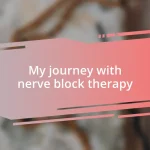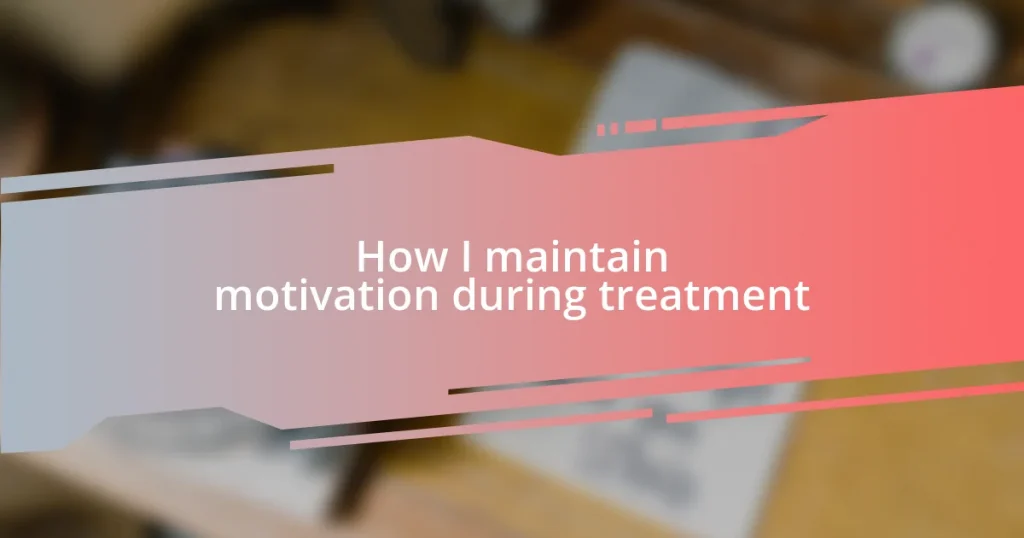Key takeaways:
- Resilience and reflection on small victories significantly contribute to maintaining motivation during treatment.
- Building a diverse support system enhances accountability and encourages shared experiences, fostering a sense of community.
- Seeking professional guidance helps navigate emotional challenges and reinforces clarity, providing essential tools for progress.

Understanding my treatment journey
Embarking on my treatment journey was akin to navigating an unpredictable landscape. I vividly remember sitting in the doctor’s office, grappling with a whirlwind of emotions. Have you ever felt that mix of hope and fear? It’s as if each day brings new challenges, and sometimes the uncertainty feels overwhelming.
As I progressed through various stages of treatment, I learned that resilience plays a crucial role. I often found myself reflecting on small victories, like getting through a particularly tough day or managing a symptom better than I had before. Those moments taught me that each step, no matter how small, contributes to a larger goal.
Support systems emerged as lifelines during this journey. I recall a night when a close friend reached out with a simple text, “How are you doing?” That small gesture turned into a deep conversation that lifted my spirits tremendously. How vital is it to have someone to share the experience with? It’s absolutely essential for maintaining motivation and finding strength in the struggle.
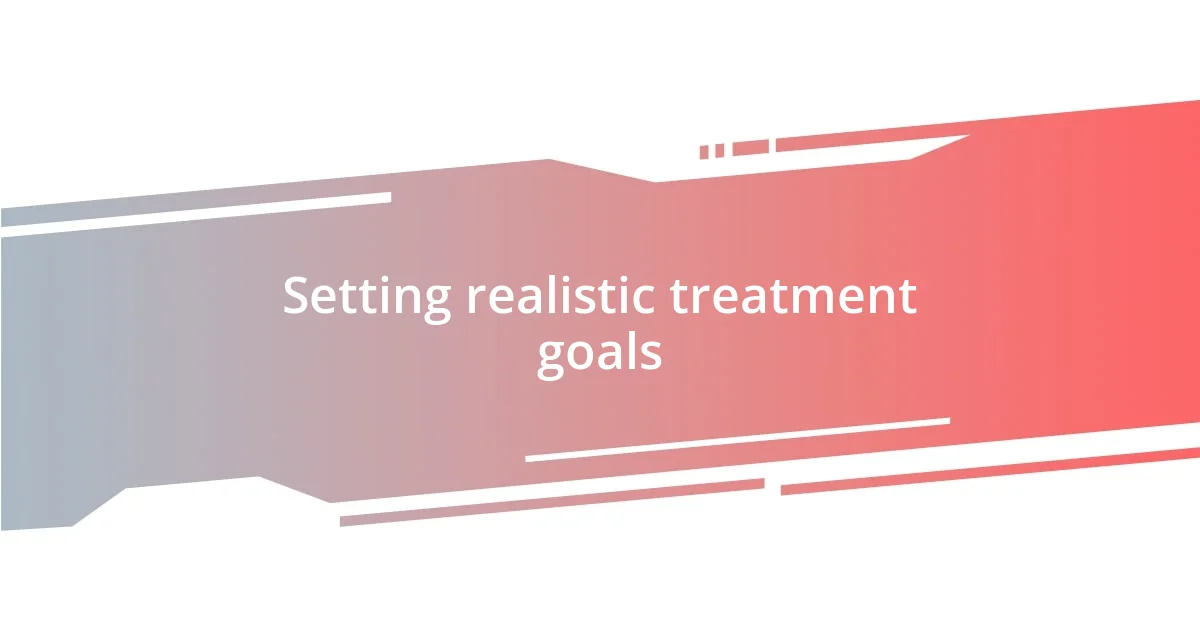
Setting realistic treatment goals
Setting realistic treatment goals is essential for maintaining motivation throughout the process. When I first started treatment, I set lofty expectations for myself, hoping I could achieve everything quickly. However, I soon learned that breaking my goals into smaller, more manageable tasks made a significant difference. For instance, instead of aiming to feel completely symptom-free in a month, I focused on one improvement each week, like walking for ten more minutes each day. This gave me a sense of accomplishment and kept my spirits high.
Another key aspect of setting realistic goals is recognizing and celebrating progress, no matter how small. I remember one week when I wasn’t feeling my best, but I managed to get out of bed and enjoy a cup of tea on the porch. Instead of disregarding it, I celebrated that moment as a victory. It’s moments like these that remind me that progress isn’t always about grand gestures; sometimes, it’s about savoring the little steps that lead to greater wellbeing.
Lastly, I found that involving my support network in goal-setting made a significant impact. Sharing my goals with friends and family not only held me accountable but also created a sense of community. When I told my friend about my weekly exercise goal, she offered to join me for a short walk. This accountability transformed an individual journey into a shared experience, enriching both my motivation and my relationships.
| Type of Goal | Example |
|---|---|
| Health Goal | Walking for 10 minutes a day |
| Emotional Goal | Enjoying a relaxing cup of tea daily |
| Social Goal | Involving a friend in weekly activities |
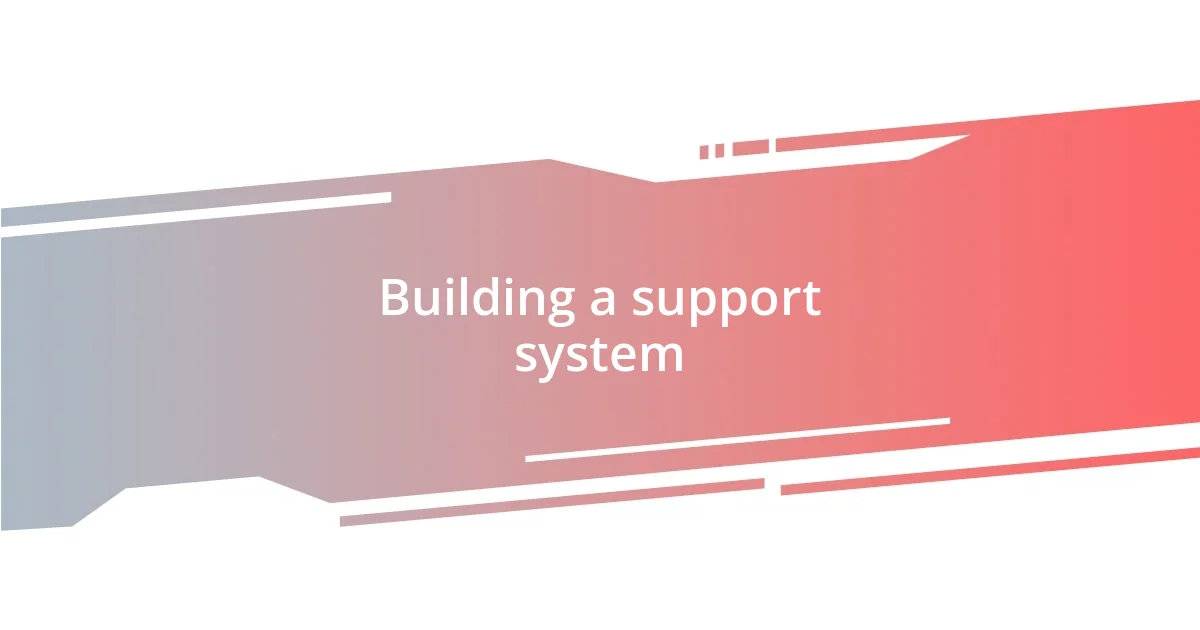
Building a support system
Building a support system was a game-changer for me during treatment. I remember a weekend when I felt particularly low, surrounded by a fog of uncertainty. A quick call to my sister turned things around; her voice felt like a warm embrace even from miles away. She listened, offered encouraging words, and reminded me of brighter days ahead. Just having someone who understands can change the tone of an entire day.
When creating a support system, it’s important to connect with different types of individuals, each fulfilling a unique role. Some people offer emotional support, while others provide practical assistance. Here’s a list of key figures you might consider including:
- Family Members: They often supply unconditional love and familiarity, which can be comforting during tough times.
- Close Friends: Friends who check in regularly can boost your mood and give you a chance to vent.
- Support Groups: Joining a group of people with similar experiences can foster a sense of belonging and shared understanding.
- Healthcare Providers: Maintaining open lines of communication with doctors and therapists ensures you receive the best guidance possible.
- Online Communities: Sometimes, connecting with people outside your immediate circle can provide fresh perspectives and tips.
Each of these connections can provide essential boosts of motivation, reminding me that I’m not alone in this journey.
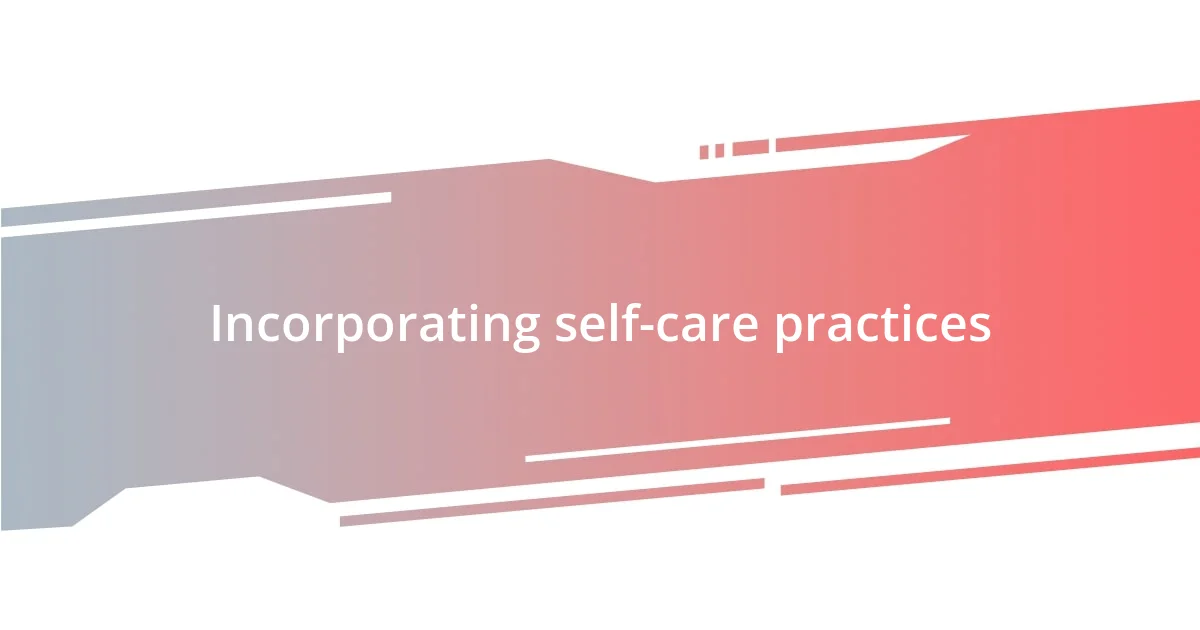
Incorporating self-care practices
Incorporating self-care practices was a vital component of my treatment journey. I vividly remember those days when I would feel overwhelmed by everything. It was in those moments that I turned to something as simple as a warm bath or curling up with my favorite book. Have you ever noticed how a little time dedicated to yourself can shift your entire mood? Taking those breaks helped me recharge and provided clarity to handle what came next.
Meditation became another essential practice for me. I still recall sitting in my living room, eyes closed, focusing on my breathing. Initially hesitant, I found that just five minutes of mindfulness could ground me during chaotic days. It was like a gentle reminder that my thoughts didn’t have to control me. In those quiet moments, I realized that self-care wasn’t just about pampering; it was about creating mental space and fostering a compassionate relationship with myself.
Incorporating healthy eating habits also played a significant role in my self-care routine. I remember experimenting with recipes full of vibrant fruits and vegetables. Preparing a colorful salad felt like an act of self-love. Every bite wasn’t just nourishment; it became a celebration of resilience in my journey. Have you tried to cook something just for yourself? It’s empowering to invest time in what fuels your body and spirit.
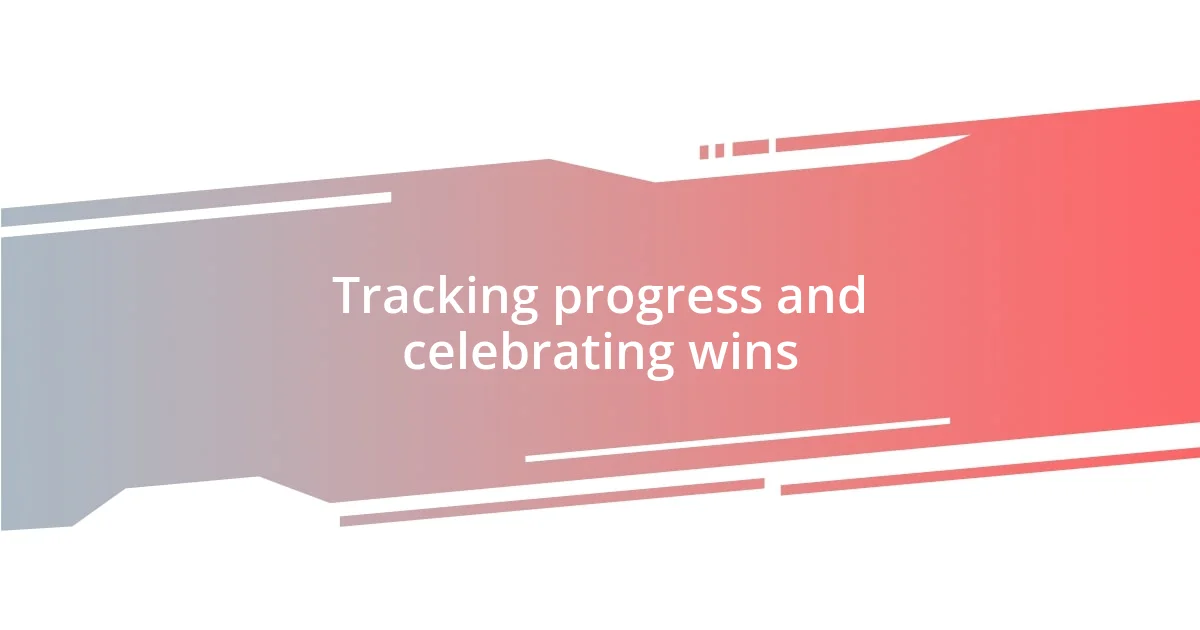
Tracking progress and celebrating wins
Tracking my progress during treatment has been incredibly rewarding. I started keeping a simple journal where I’d note down not just my symptoms but also the small victories—like making it through a tough day or trying something new. Each entry became a tangible reminder of how far I’d come. Have you ever taken time to reflect on your journey? It really opened my eyes to the resilience I didn’t even realize I had.
Celebrating wins, no matter how small, was crucial for sustaining my motivation. I recall one instance where I treated myself to a favorite treat after completing a particularly challenging week of treatment. It wasn’t just about the dessert; it signified a personal milestone. I learned that acknowledging these moments gave me the energy to keep pushing forward. Does treating yourself feel indulgent or deserved? For me, it became an essential ritual in my journey.
I also found it meaningful to share my progress with my support system. I remember texting a friend about a recent achievement, and the joy in her response felt like a warm cheerleader’s encouragement. These shared celebrations of success not only reinforced my motivation but also deepened my connections with those around me. How exhilarating is it to have people genuinely invested in your journey? It’s a reminder that I’m not alone, and it keeps my spirits high.
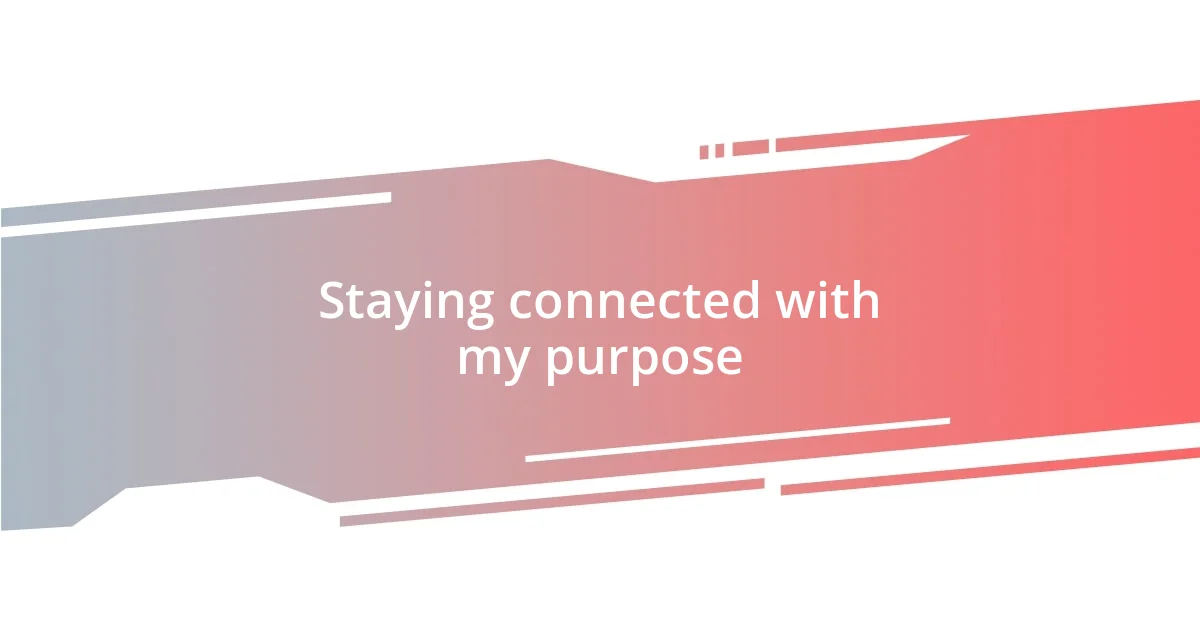
Staying connected with my purpose
Staying connected to my purpose has been pivotal during treatment. I’ve often found myself reflecting on why I started this journey in the first place. Whether it was the desire to regain my health or the dream of a future filled with possibilities, keeping those reasons front and center has fueled my motivation. Have you ever paused to really think about your motivations? It can be incredibly grounding.
There were days when the weight of the process felt insurmountable, and in those moments, I reminded myself of the joy of reaching certain goals. For example, I vividly remember cheering myself on when I managed to participate in a family gathering despite my fatigue. It felt like not just a personal victory, but a reaffirmation of my purpose—a reminder that I value connection and love with my family above all. What drives you through tough times? It’s essential to remember those core values that light the way forward.
I also found it helpful to create a vision board that highlighted my aspirations, not just related to health, but life in general. I chose images and quotes that resonated with me and placed it above my workspace. Every time I saw it, I couldn’t help but feel a tug toward my purpose. It’s interesting how visual reminders can act like motivation boosters, isn’t it? This simple act of surrounding myself with my goals has kept my sense of direction alive, even when treatment felt overwhelming.

Seeking professional guidance when needed
Seeking professional guidance can be a game-changer when it comes to maintaining motivation during treatment. I remember my first session with a therapist; I walked in feeling lost and unsure but walked out with a clearer path and strategies that felt more manageable. Have you ever felt that weight lift after talking to someone who truly understands? It can be incredibly reassuring to have a professional help you navigate the emotional challenges.
There were times when my optimism waned, and I realized that self-help methods weren’t enough. Seeking out a support group connected me with others who shared similar experiences; their stories gave me perspective and hope. Listening to how they found motivation reminded me that I wasn’t alone in this fight. Isn’t it powerful to know there’s a community that understands your struggles? Those shared moments became a source of strength I didn’t anticipate.
Consulting with medical professionals also shaped my journey significantly. Regular check-ins with my doctor allowed me to ask questions and understand my treatment better. I vividly recall one appointment where my doctor reassured me about the side effects I was experiencing, normalizing my feelings. This simple act of reassurance transformed my anxiety into acceptance. Have you ever felt calmer simply by having clarity about your situation? Seeking professional guidance provided me with essential tools to keep moving forward, reinforcing my belief in the process.








